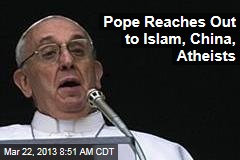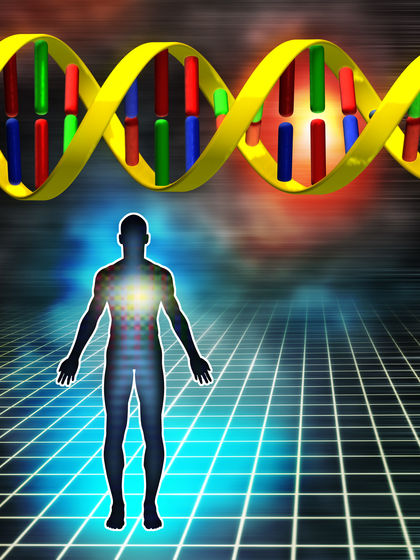So what happened to the simple Jesus of peace and love, man, and how did the church manage to hide him behind so much dogma? Well, sensibly enough, it's a good time to talk about this this week, because it's Trinity, and never has the dogma been laid on thicker than it is this week. Because you know what creed we used on Sunday? Sure you do. The Athanasian Creed. The Athanaisan creed is long, it's long-o. It is about two pages in the hymnal, and we only use it twice a year. But why do we use it at all? Well, we use it because it's never been more necessary. Probably in the twelfth century, most people who were in western civilization (the aptly named Christendom), would have been right up on their knowledge of just who this Jesus fella was, and they would have known full well that he was fully God and fully Man. He was both, at the same time, all the time. No problem so far there, I suppose.
 But then something strange started to happen. People began to do on a huge scale what they accused the apostles of doing - making Jesus into something that he clearly isn't. You see, Jesus Christ is less of a polarizing figure, and more of a Gordon Freeman, if you catch my drift. The reason that he has been so uncontroversial lately is for the same reason that Dr. Freeman remains so popular - he has no personality of his own. That is to say, as Gordon Freeman stands for whatever you want to place on him, so too does Jesus Christ - he is whatever you want him to be. He is the ultimate tabula rasa, the ultimate blank slate upon which you can project whatever your wants, needs, and desires.
But then something strange started to happen. People began to do on a huge scale what they accused the apostles of doing - making Jesus into something that he clearly isn't. You see, Jesus Christ is less of a polarizing figure, and more of a Gordon Freeman, if you catch my drift. The reason that he has been so uncontroversial lately is for the same reason that Dr. Freeman remains so popular - he has no personality of his own. That is to say, as Gordon Freeman stands for whatever you want to place on him, so too does Jesus Christ - he is whatever you want him to be. He is the ultimate tabula rasa, the ultimate blank slate upon which you can project whatever your wants, needs, and desires.That's how you can have George W. Bush praising Jesus Christ even while bombs are dropping on Iraq, and you can also have Jimmy Carter praising Christ while denouncing Bush's foreign policy. It's how you can have Jesus simultaneously being on side with warhawks and doves, those in favor of disarmament and deterrence, capitalists and socialists, Christians and Muslims, Atheists and believers, and all points in between. In fact, if you poll a room, 99% of people will be fundamentally convinced that Jesus Christ agrees with them on pretty much everything. He loves who they love, and hates who they hate.
It helps that Freeman is the savior of the whole world, and you can essentially take over for him, without all the nagging existing personality getting in the way. Unlike controlling Fenix, or even Master Chief, you really put yourself in the shoes of the silent Gordon Freeman.
There's one small problem with this, though, and that is that Jesus certainly is not a blank slate. Gordon Freeman is, because he never speaks, and you can imagine yourself taking his place. It also are Freeman, and he does exactly what you want him to do. And everyone loves him. But Jesus does talk. A lot. And when he does, as he did in the reading on Sunday, people find that he doesn't agree with them. At all.
When Jesus talks about serious stuff, the people who are there break into tears because of their own sinfulness, or they hide their faces, they fall to their knees in worship, they disappear altogether, or they pick up rocks to stone him. Nobody sort of rubs their chin and is vaguely thankful that Jesus agrees with them. No, if you love Christ and you've never picked up rocks to throw at him, then you haven't listened to a word he said. For example, and this is a movie moment that has stuck in my head for years. Skip ahead to 1:11 of this trailer if you're easily bored, and watch an incredibly brief encounter between Mark Whalberg and some girl. Go ahead. I'll wait.
If you were paying attention to the news this week, you would have seen that Pope Francis spoke to the media, and somehow or another, he mentioned that atheists could be saved as long as they do good. And all the atheists on Reddit exploded with delight - Finally, a Pope who tells us that we will all be saved! We will all be saved because we all do good all the time!
Well, here's the juice. If you heard Francis' words, and were elated, because it means that you can be saved by what you do, then I have some crushingly bad news for you. Francis is right - as long as atheists did good, they could be saved. But it comes down to the notion expressed in the scriptures, that there is none righteous, not even one, and that all have sinned, and fallen short of the glory of God. Or, if that's a bit esoteric for you, then ask yourself this - why do you lock your cars and doors and bikes up constantly, because petty criminals are prowling? Or is it because everyone is one temptation away from being a total scumbag.
The one thing missing is an open stocktaking of one's own life, looking seriously at what you've done, and what you've failed to do. If you're that great, then how come the world is still a mess, how come nobody trusts anyone else, how come the world is heating up, children are dying in Asia from simple diseases to cure, and everyone hates everyone else. Why does that happen? Because other people are jerks?
No.
You have a Bible. Pick it up. Open it once in a while. Put yourself in the shoes of the rich young ruler, who asked Jesus what he had to do to inherit eternal life, and Jesus gave him a laundry list of commandments, and the rich young ruler said he'd done all of those. And what did Jesus say? Not 'well done,' but 'then sell everything, give it to the poor, and follow me.' If you think that Jesus would honestly approve of your life, then you haven't been paying attention. And, to quote Marky Mark, I hate to break it to you, but Jesus is most definitely mad at you. And if you dare to disagree with me on this one, or you figure that this doesn't apply to you, then my answer to you is to let the man talk. Let Jesus say what he say. Don't put words in his mouth, don't talk for him or over him, don't make him agree with you, let him speak. If he does, he'd be critical of you. And he'd be critical of me. I'm a pastor in God's holy church, and I mess up worse than anyone. Actually, I probably don't, but I only see my own failings, and I know that they're a bit of a problem. If I let Jesus speak, instead of speaking for him, he has a lot to say about why I'm a mess, and about why I disappoint people.
That's the bad news. But if I let the Dogma speak, it says something wonderful. If I let the creed speak, instead of me speaking it like a robot, if I let the dogma be what it is, it says something amazing. It says that everyone is a failure. That's why the world is as bad as it is. It says that the problems in the world are not just of my making, but we all make them. It says that my failings are part of a bigger pattern, and that we all have work to do. But if we know that we have work to do, if we admit that we have dug ourselves into a big ol' hole. And that's a problem. And here, I am speaking to whom? To all of you, but most especially to those of you who believe that the problems in the world are the fault of everyone else. Whether Atheist or Christian, you both think the same way - that you are righteous, and that heaven is a given. And as long as you believe this, sincerely believe this, you're damned.
Damned.
Go ahead, pick up the rocks, but that's the issue. Your choices are to either become numb to God and his goodness, or to look through the scriptures, and find out where it speaks to you. Don't worry about the parts that speak to someone else, they're not for you, and you don't need to worry about them. But if you get through the entire New Testament, and Jesus never skewers you once, go back, and read it again. And yes, you can go through and say that Jesus' words don't apply to you, and then it doesn't matter at all. But if you respect Jesus, love him and cherish him, if you think he was a neat guy, and he had something important to say, then listen to him. Because he's going to skewer you with his words, if you'd listen. And if you notice that, then take heart. Because the dogma tells you something else. You're a scumbag, I'm a scumbag, we all know that, of course. And if you know that, it's wonderful, because the big promise of the Holy Scriptures is that you don't have to be perfect. You just have to know how imperfect you are, turn to God, and apologize to him, and to each other. It's the greatest gift of all that was given - it frees you from yourself.
And that's what we all want to be freed from. You seek out friends, a mate, a spouse, God himself, a family, a community, because you don't want to only be with yourself for forever. And that's where God comes in. He removes all those things that separate you from each other, and from him. You get laid bare by Christ, and he restores you. He puts you back together where you have gone wrong. Jesus is most definitely angry with you, but he doesn't stay that way. As long as you let go of your nonsense, he'll take it away. If you let Jesus speak, he'll speak to you in words of both Law and Gospel, and ignore either of those at your peril. Let him speak, and he'll point out your sin, and give you his grace. Let him speak, and he'll be more than a silent protagonist - he'll be a savior.
PJ.








